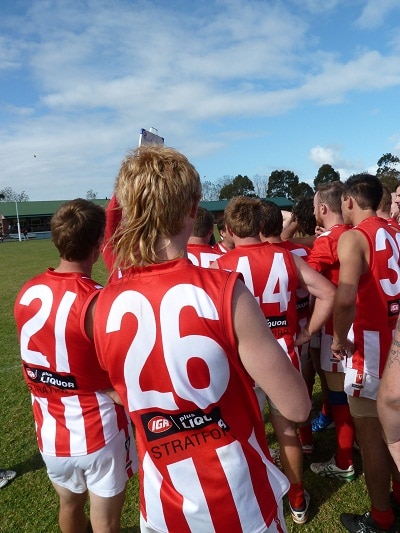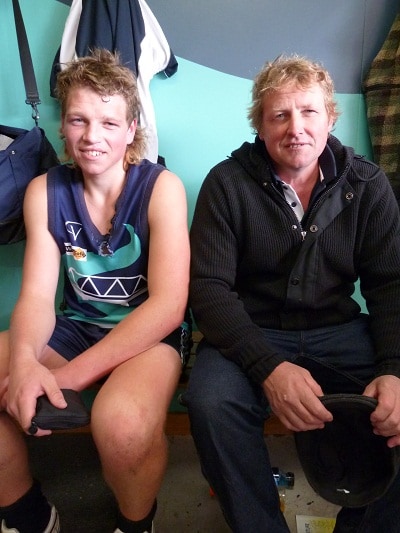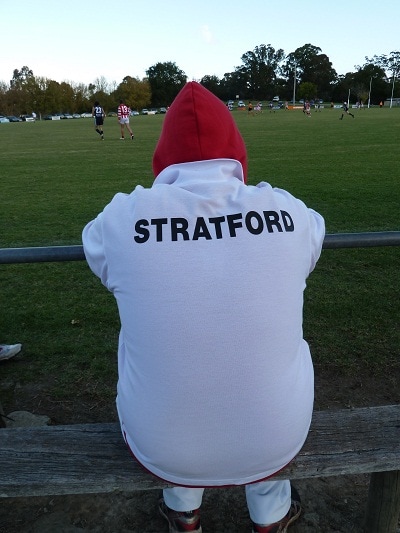Wood smoke hung in the air at Stratford and I knew this was country. Early in the morning I had dropped my partner and our young boy at the airport and turned the car to drive east, listening to Emmylou Harris on the radio, and the Coodabeen Champions from the Yallourn North turn-off, passing livestock trucks, silage on flatbeds, open-cut mines, and a Collingwood flag hoisted up a pole in a front yard outside Traralgon and, for now, flapping proudly. I stopped at Stratford for coffee and conversation, and still had further to go.
On Saturday morning, I was off to watch the eastern-most game of footy in Victoria. It was my first time returning to see one of my old teams play, on a ground on the alluvial flats of the Snowy River. I was returning to country football, to a simple pleasure, a small community – and it felt like going home.

For the best part of two seasons, in 2001 and 2002, I played centre half-forward for the Snowy Rovers Football Club in Orbost. It was a team of timber-getters, mill-workers, butchers, a policeman, farm hands and labourers. As with the town, we were up against it. All the best footballers moved elsewhere. One end of our home ground faced Voss Motors, owned by the uncle of Michael and Brett, both of whom had long since gone north. Petrol money went to a few blokes who travelled from Lakes Entrance, Melbourne, and two from Mallacoota: Graham Dempster (24 goals in 64 games with South Melbourne in the 1970s), and his young son, Sean, now an All-Australian who’s played in five grand finals for one premiership. Both played in a forward pocket.
I milked cows on the upstream river flats at Orbost, lived alone in a ramshackle farm house, rode a bicycle into town for footy training, and lived each week mostly for the game at two o’clock on a Saturday afternoon. It seemed sometimes as if the whole town came to watch. Everybody was there. I was always happiest when playing.
Fondest memories are of games won, which was seldom. Three goals kicked against our cross-town rivals in the rain, and an envelope given to me in the pub afterwards, containing $50 for my contribution. Beating Lindenow away, when down at three-quarter time. And, there was the afternoon at Lakes Entrance, when I ran into Greg Dear’s elbow.
This was the last game of the 2001 season. Lakes Entrance were a top-four side and we were decidedly bottom-four. That is, we had nothing to lose. I remember kicking two goals in the salty air (and fluffing a third), a spectator on the boundary calling me a “woolly mammoth”. In the third quarter, in loose play on our defensive side of the wing, I remember their ruckman, Greg Dear, gathering the ball in space, and it was my turn to go.
The equation was simple. He was a three-time Hawthorn premiership player, who from 1994 played 53 games in three seasons at Richmond, but for now stood 198cm, weighed about 100kg, had the ball, and was turning towards goal. I left my man and had eyes only for his hips. He raised a forearm to fend me off. My jaw collected his elbow and I thought I needed dental work. The umpire blew his whistle. It was our free kick.
Snowy Rovers beat Lakes Entrance that afternoon by a few goals, and we drank all night at pubs in two towns. I slept most of Sunday, nursing bruises and aches, rousing myself in the afternoon only to go milk cows.
**
Saturday night, and I found myself near the Buchan turn-off on the drive home when the game starts. Talk on ABC radio before the bounce was of Richmond “taking a scalp”. None in the commentary box tip the Tigers to win, but anticipation is high. “Conditions perfect,” says the night’s expert commentator, former Western Bulldogs player Lindsay Gilbee. I’m the only car on the road, driving through darkened forests, and in my heart I’m going to a place I now want to be – the flood-lit cauldron of the MCG.
Listening on the radio is a great pleasure of participation. The game is imagined. It’s an aural experience – the umpire’s shrill whistle, the crowd’s crescendo, the string of players’ names following the ball. For the listener, the interpretation is, by necessity, passive. “Rance went to ground when he probably didn’t have to,” says a commentator early in the first, and I’m in no position to think otherwise.
Geelong players sound to be sharing a lot of the footy early. From my team, I hear the names Edwards and Petterd and Chaplin called often. But there’s also “poor kick from Jackson”, and Geelong goals, and “light drizzle is falling”, and “Richmond turning it over big-time in the defensive 50”, and this starless night all of a sudden looks awfully dark. Then, at Bruthen, I drop onto the Tambo River flats and Brandon Ellis marks inside 50 and kicks a goal . . . I see a light.
Nearing Bairnsdale, Jake King kicks a goal on his left boot, and it sounds as if most of the crowd noise is for the Tigers. A minute later and ABC Grandstand commentator Dan Lonergan exclaims “RIEWOLDT!!!!!” and I pump a fist in the air. Jake soon after kicks another goal from a free kick and, for now, the drive home isn’t looking so long.
I stop in Bairnsdale at quarter-time for petrol and a souvlaki, which I scoff down behind the wheel. I’ve no time to waste. “Richmond on fire here at the MCG,” says a commentator. “The Cats on the back foot.” I become consumed by the running narrative of the radio, pulling over often to jot down the language of the game, of “loose men everywhere” and a kick “into the teeth of goals”, and my side “absorbing the pressure”, and adding some “breathing space”.
Dustin Martin kicks his second second-quarter goal at the 19-minute mark. I am about nine kilometres on the Melbourne-side of Bairnsdale and my team is 19 points up against the Cats, and I am not sure I believe what I am hearing.
**
The season after I left Orbost to play centre-half-back for the Cooma Cats, before returning to suburban football in Sydney, the Snowy Rovers merged with their cross-town rivals, Orbost – an amalgamation to secure the future of both clubs in the East Gippsland Football Netball League. The bigger towns down the line had more players, more money, more jobs, and more prospects. It had been years since either of the Orbost teams had troubled the top of the ladder. In my playing days, I don’t ever remember getting within 10 goals of Bairnsdale.
So, 10 years ago, two honour boards became three, a new jumper was hatched, and the Orbost Snowy Rovers Football Club was to unite a town. “For a lot of people, the club means everything,” says current president, Royston Nettleton. “It’s a reflection on the town. With timber industry closures, and the loss of employment, it means the town and the footy club have been battling. But if there’s a good vibe around the footy club, there’s a good vibe around the town.”
Royston (known otherwise as ‘Doc’, like his father before him) is a 45-year-old dairy farmer, who milks a herd of 150 cows, has played 484 club games, and still runs around up forward in the reserves, while two of his three boys play in the seniors. I’ve played against Royston, and long ago milked cows for his parents, and reckon his mother, Bon, on a wood fire stove, makes the best porridge a man could hope for.

It feels good to be back in Orbost, among familiar faces, smelling the liniment and earth in the change-rooms before the game, remembering the anxiety and fear before the bounce, and slipping back into the casual camaraderie among footballers and netballers, and all who come along to watch. The ground is ringed by cars, behind a boundary fence festooned with signs of local sponsors: plumbers, builders, bakers, steam cleaning, lawn mowing, the Marlo Hotel, Commonwealth Hotel, the Snowy River Mail. Football, it seems, is everybody’s business.
Split hardwood logs burn in three fire tubs on the hill behind the clubhouse-end goals, where a crowd mostly of men gather – ‘tinny’ in right hand, left hand in pocket – before the beer caravan, and in front of them, a field of their long-held dreams. “We lost a footy last year into a fire bucket,” says Russ Healey, a now-retired full-back. “It dropped straight in after a goal and burnt all the laces.”
A fresh wind now blows from the south, a flock of rose-breasted cockatoos shriek across the field above. Before the game, parked on a hill down the river end, I catch up with Ted Potter, whose son plays in the reserves. Long retired, Ted was a phys-ed teacher at Orbost High School, but is better known as the Collingwood footballer, whose wayward handball in the 1966 VFL Grand Final, was intercepted by Barry Breen and resulted in St Kilda’s one-point victory. He also holds a place in football’s records – the most career games (182) without a goal.
A gentle and considered man, we talk about his children, his recent planting of sugar gums, and I tell him about my writings about being a Richmond supporter. “They’re on the cusp,” he says, “of having a really good team.”
**
Saturday night’s game turned sour as I drove through Sale. The radio commentators think Ivan Maric has slipped and done a knee. No sooner is he off the ground than Tyrone Vickery is knocked out in the centre square, and taken from the field, bloodied and groggy. We’re two ruckmen down in two minutes. Scuffles break out. The ball is brought back for a free kick against us. Fifty metre penalties go against us. It sounds like one-way traffic, and there’s nothing we can do to stop it. When Allen Christensen kicks a goal late in the third quarter – “the perfect crumber’s goal” – the imagined game looks lost to us. Then Bachar Houli hits the post, from directly in front with the last scoring shot of the quarter, and our slim hopes fade.

Traffic lights at Traralgon herald the start of the last quarter, and soon after I wish to turn the radio off. Two quick goals from Tom Hawkins – one from a defensive turn-over by our captain – and the game has gone. Big Ivan runs around on one leg. The commentators reckon ‘Cotch’ has a sore knee. All the positive talk – all the heart-warming words – are about Geelong and how good they are.
“They’re playing all over the top of Richmond,” says one commentator. “This could turn into a blow-out,” says another.
**
Last Friday morning, I rode my bicycle to training at Punt Road and was comforted to see young men running through drills and calling out names – “Bach, Bach” “Jack, Jack” – as once I had done on other fields, in other places, with other people. It felt wonderfully familiar: the grass, the sound of the coach’s whistle, the cohesion, the skill sets, the ideas, the endeavour.
But we never had so many people witness our rehearsal. We never signed autographs afterwards. We never had teachers come along with a group of international language students. “They’re mostly from China and Vietnam,” says one of the teachers, Tim Strike, a Collingwood supporter. “We bring them along to give them a bit of local culture.”
After the players leave the field and the crowd files out – the last of them a group of schoolboys from Alice Springs on a footy tour – I meet Joel Ferguson, 28, who’s the assistant retail manager at the Tigerland Superstore. It’s his job to lock the gate. We talk about football – he’s the player-coach of Roxburgh Park Magpies in division two of the Essendon District Football League – and the upcoming Richmond game on Saturday night.
He asks if I’m going and I tell him I’m missing it and, instead, driving four hours east to see one of my old teams play. He asks who they are and I tell him they were once called the Snowy Rovers. His face opens into a smile and he says his father, Rod, played for the Rovers in 1970 in their inaugural season, while working on his brother’s farm. Joel says he knows the club well, he’s heard the stories.
It’s a small world.
I ask Joel about his team, and how long he hopes to keep playing for. “As long as I can,” he says. “I love football. I love everything about football. I love the feeling I get when I play football. You can’t beat it.”
These words, I want to think about all week.
Tiger tiger, burning bright.
or Twitter: @dugaldjellie



